William S. Gilbert & Arthur Sullivan
Sir William Schwenck Gilbert (1836–1911) and the composer Arthur Sullivan (1842–1900) collaborated on fourteen comic operas between 1871 and 1896, of which H.M.S. Pinafore, The Pirates of Penzance and The Mikado are among the best known. Gilbert, who wrote the words, created fanciful "topsy-turvy" worlds for these operas where each absurdity is taken to its logical conclusion, fairies rub elbows with British lords, flirting is a capital offence, gondoliers ascend to the monarchy, and pirates turn out to be noblemen who have gone wrong. Sullivan, six years Gilbert’s junior, composed the music, contributing memorable melodies that could convey both humour and pathos. Their operas have enjoyed broad and enduring international success and are still performed frequently throughout the English-speaking world. Gilbert & Sullivan introduced innovations in content and form that directly influenced the development of musical theatre throughout the 20th century. The operas have also influenced political discourse, literature, film and television and have been widely parodied and pastiched by humorists. Producer Richard D'Oyly Carte brought Gilbert & Sullivan together and nurtured their collaboration. He built the Savoy Theatre in 1881 to present their joint works (which came to be known as the Savoy Operas) and founded the D'Oyly Carte Opera Company, which performed and promoted Gilbert & Sullivan's works for over a century.
The Fourteen Operas of
Gilbert & Sullivan
"Thespis" or "The Gods Grown Old" (1871)
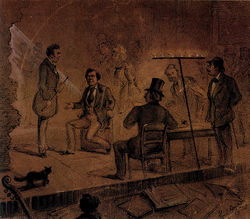
The story follows an acting troupe headed by Thespis, the legendary Greek father of the drama, who temporarily trade places with the gods on Mount Olympus, who have grown elderly and ignored. The actors turn out to be comically inept rulers. Having seen the ensuing mayhem down below, the angry gods return, sending the actors back to Earth as eminent tragedians, whom no one ever goes to see.
Gods
- Jupiter, Aged Deity
- Apollo, Aged Deity
- Mars, Aged Deity
- Diana, Aged Deity
- Mercury
- Thespis, Manager of a Travelling Theatrical Co.
- Sillimon, His Stage Manager
- Timidon
- Tipseion
- Preposteros
- Stupidas
- Sparkeion
- Nicemis
- Pretteia
- Daphne
- Cymon
- Chorus of aged deities and thespians
"Trial By Jury" (1875)
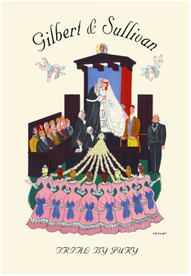
In a breach of promise case, the Learned Judge and Jury are somewhat smitten by the pretty Plaintiff's charms, and the Defendant is hard pressed to explain that indeed he loved this girl once, but fell in love with another. Despite his suggestion that he marry both women, the Learned Judge has his own solution...he will marry the Plaintiff himself.
- The Learned Judge (Comic Baritone)
- The Plaintiff (Soprano)
- The Defendant (Tenor)
- Counsel for the Plaintiff (Baritone)
- Usher (Bass Baritone)
- Foreman of the Jury (Bass)
- Associate (Silent Role)
- Chorus of Gentlemen of the Jury, Barristers, Attorneys, Bridesmaids and Members of the Public
"The Sorcerer" (1877)

A young man, Alexis, is obsessed with idea of love levelling all ranks and social distinctions. To promote his beliefs, he invites the proprietor of J. W. Wells & Co., Family Sorcerers, to brew a love potion. This causes everyone in the village to fall in love with the first person they see and results in the pairing of comically mismatched couples. In the end, Wells must sacrifice his life to break the spell.
- Sir Marmaduke Pointdextre, an Elderly Baronet (Bass Baritone)
- Alexis, of the Grenadier Guards (Tenor)
- Dr. Daly, Vicar of Ploverleigh (Baritone)
- Notary (Bass)
- John Wellington Wells, of J. W. Wells & Co., Family Sorcerers (Comic Baritone)
- Lady Sangazure, a Lady of Ancient Lineage (Contralto)
- Aline, her Daughter, betrothed to Alexis (Soprano)
- Mrs. Partlet, a Pew Opener (Contralto)
- Constance, her Daughter (Mezzo Soprano)
- Hercules (Speaking Role)
- Chorus of villagers
"H.M.S. Pinafore" or "The Lass That Loved a Sailor" (1878)
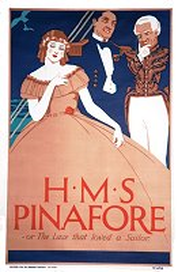
The story takes place aboard the British ship H.M.S. Pinafore. The captain's daughter, Josephine, is in love with a lower-class sailor, Ralph Rackstraw although her father intends her to marry Sir Joseph Porter, the First Lord of the Admiralty. She abides by her father's wishes at first, but Sir Joseph's advocacy of the equality of humankind encourages Ralph and Josephine to overturn conventional social order. They declare their love for each other and eventually plan to elope. The captain discovers this plan, but, a surprise disclosure changes things dramatically near the end of the story.
- The Rt. Hon. Sir Joseph Porter, KCB, First Lord of the Admiralty (Comic Baritone)
- Captain Corcoran, Commander of H.M.S. Pinafore (Baritone)
- Ralph Rackstraw, Able Seaman (Tenor)
- Dick Deadeye, Able Seaman (Bass Baritone)
- Bill Bobstay, Boatswain's Mate (Baritone)
- Bob Becket, Carpenter's Mate (Bass)
- Josephine, The Captain's Daughter (Soprano)
- Cousin Hebe, Sir Joseph's First Cousin (Mezzo Soprano)
- Mrs. Cripps (Little Buttercup), A Portsmouth Bumboat Woman (Contralto)
- Chorus of Sailors, Marines, First Lord's Sisters, His Cousins and His Aunts
"The Pirates of Penzance" or "The Slave of Duty" (1879)

The story concerns Frederic, who, having completed his 21st year, is released from his apprenticeship to a band of tender-hearted pirates. He meets Mabel, the daughter of Major-General Stanley, and the two young people fall instantly in love. Frederic finds out, however,
that he was born on 29th February, and so, technically, he only has a birthday each leap year. His apprenticeship indentures state that he remains apprenticed to the pirates until his 21st birthday, and so he must serve for another 63 years. Bound by his own sense of duty, Frederic's only solace is that Mabel agrees to wait for him faithfully.
- Major-General Stanley (Comic Baritone)
- The Pirate King (Bass Baritone)
- Samuel, his Lieutenant (Baritone)
- Frederic, the Pirate Apprentice (Tenor)
- Sergeant of Police (Bass)
- Mabel, General Stanley's Daughter (Soprano)
- Edith, General Stanley's Daughter (Mezzo Soprano)
- Kate, General Stanley's Daughter (Mezzo Soprano)
- Isabel, General Stanley's Daughter (Speaking Role)
- Ruth, a Piratical Maid of all work (Contralto)
- Chorus of Pirates, Police and General Stanley's Daughters
"Patience" or "Bunthorne’s Bride" (1881)
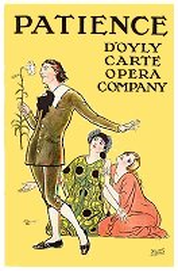
In a world gone mad with languid ladies and affected gentlemen, the lovesick maids of Castle Bunthorne forsake their handsome soldier suitors to pursue poet aesthete, and fake, Reginald Bunthorne. But he loves the village milkmaid, Patience, who doesn't like poetry or understand love. When Patience finally learns what love is, it's Reginald’s rival she falls for.
- Colonel Calverley, an Officer of the Dragoon Guards (Bass Baritone)
- Major Murgatroyd, an Officer of the Dragoon Guards (Baritone)
- Lieut. The Duke of Dunstable, an Officer of the Dragoon Guards (Tenor)
- Reginald Bunthorne, a Fleshly Poet (Comic Baritone)
- Archibald Grosvenor, an Idyllic Poet (Baritone)
- Mr. Bunthorne's Solicitor (Silent Role)
- The Lady Angela, a Rapturous Maiden (Mezzo Soprano)
- The Lady Saphir, a Rapturous Maiden (Mezzo Soprano)
- The Lady Ella, a Rapturous Maiden (Soprano)
- The Lady Jane, a Rapturous Maiden (Contralto)
- Patience ,a Dairy Maid (Soprano)
- Chorus of Officers of the Dragoon Guards and Rapturous Maidens
"Iolanthe" or "The Peer and the Peri" (1882)
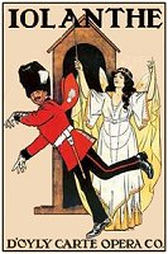
Iolanthe is a fairy who dared to marry a mortal man; banished from the dominion of the magical creatures, Iolanthe was forced to leave her husband and raised her son, Strephon, on her own. Years later, Strephon has fallen in love with Phyllis, whose guardian is the Lord Chancellor of the Court of Chancery. Phyllis is also enamoured of Strephon, but since he earns his living as a lowly sheep herder, the Lord Chancellor opposes their marriage. Wanting her son to be happy, Iolanthe conspires with her fairy friends to overcome the Lord Chancellor's opposition, but this leads to even further complications.
- The Lord Chancellor (Comic Baritone)
- George, Earl of Mountararat (Baritone)
- Thomas, Earl Tolloller (Tenor)
- Private Willis, of the Grenadier Guards (Bass)
- Strephon, an Arcadian Shepherd (Baritone)
- Queen of the Fairies (Contralto)
- Iolanthe, a Fairy, Strephon's mother (Mezzo Soprano)
- Celia, a Fairy (Soprano)
- Leila, a Fairy (Mezzo Soprano)
- Fleta, a Fairy (Speaking Role/Chorus)
- Phyllis, an Arcadian Shepherdess and Ward in Chancery (Soprano)
- Chorus of Dukes, Marquises, Earls, Viscounts, Barons and Fairies
"Princess Ida" or "Castle Adamant" (1884)
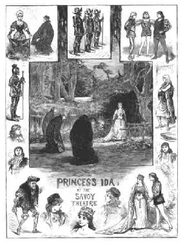
Prince Hilarion had been married in infancy to Princess Ida, daughter of King Gama. The Princess, however, has set up a college for women from which all men are barred. Hilarion and his friends infiltrate the castle and ultimately the men, led by Hilarion's father, King Hildebrand, stage a full-scale invasion. Ida is abandoned by her women and finally surrenders to her Prince.
- King Hildebrand (Bass Baritone)
- Hilarion, King Hildebrand's Son (Tenor)
- Cyril, Hilarion's Friend (Tenor)
- Florian, Hilarion's Friend (Baritone)
- King Gama (Comic Baritone)
- Arac, King Gama's Son (Bass Baritone)
- Guron, King Gama's Son (Bass Baritone)
- Scynthius, King Gama's Son (Bass)
- Princess Ida, King Gama's Daughter (Soprano)
- Lady Blanche, Professor of Abstract Science (Contralto)
- Lady Psyche, Professor of Humanities (Soprano)
- Melissa, Lady Blanche's Daughter (Mezzo Soprano)
- Sacharissa, Girl Graduate (Soprano)
- Chloe, Girl Graduate (Speaking Role/Chorus)
- Ada, Girl Graduate (Speaking Role/Chorus)
- Chorus of Soldiers, Courtiers, Girl Graduates and Daughters of the Plough
"The Mikado" or "The Town of Titipu" (1885)
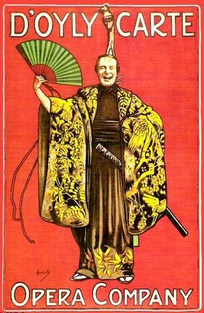
The story of The Mikado begins in the town of Titipu in Japan where, having introduced themselves, Japanese nobles meet a wandering minstrel named Nanki-Poo. He tells them of his love for Yum-Yum whom he first saw as he was playing in the Titipu town band. Yum-Yum was engaged to Ko-Ko, a cut price tailor, but he has been sentenced to death for flirting, so Nanki-Poo returns to find his beloved Yum-Yum and marry her. The death sentence for flirting is the idea of the bloodthirsty ruler of Japan, the Mikado. The gentlemen of Titipu decide to get round this law by creating Ko-Ko Lord High Executioner on the grounds that he is then unlikely to execute himself. All the senior Titipu civil servants resign in protest at these shenanigans only to find that the ambitious Pooh-Bah snaps up all their jobs, salaries and perks to become Lord High Everything Else. Ko-Ko is set to marry Yum-Yum who arrives with her girl friends, Pitti-Sing and Peep-Bo, three little maids from school. When Yum-Yum sees the handsome Nanki-Poo, she is overjoyed since she does not love Ko-Ko, but duty makes her reluctantly realise that her wedding with the recently ennobled cheap tailor must take place. Then a crisis hits the town. The Mikado is coming to visit Titipu to check that his savage law has been carried out. Since Nanki-Poo has decided to kill himself because he cannot marry Yum-Yum, Ko-Ko convinces him to become the necessary victim the Mikado wants to have executed. Nanki-Poo agrees on the condition that he weds Yum-Yum and they enjoy a month's married bliss before he gets the chop, after which, Ko-Ko can marry her. This seems to fit the bill, and everyone rejoices until another crisis descends in the frightening person of Katisha, an aristocratic older lady who was engaged to Nanki-Poo before he fled the court unable to face marrying her. She tries to reveal Nanki-Poo's identity as the son of the Mikado and heir to the Japanese throne, but the local people refuse to listen to her, and she storms off vowing revenge. On Yum-Yum's wedding day, Ko-Ko brings news that due to another cruel law, the wife of a beheaded man must be buried alive, a fate Yum-Yum does not relish on account of its stuffiness. Pooh-Bah and Ko-Ko decide that the only solution is to fool the Mikado. They will let Yum-Yum and Nanki-Poo get married, pack them off abroad on a honeymoon, then draw up false documents and lie to the Mikado about the execution. Accompanied by Katisha, the Mikado arrives and is informed by Ko-Ko, Pooh-Bah and Pitti-Sing of the alleged execution of Nanki-Poo. The plan backfires however, since yet another crazy Japanese law insists that no matter how ignorant of their actions, everyone remotely associated with the death of the heir apparent must be boiled alive. Since the bloodthirsty and husband hungry Katisha is keen to see the plotters killed, the only solution seems to be for someone to marry Katisha as quickly as possible, then get her to beg the Mikado for mercy. Ko-Ko draws the short straw and marries is chosen to marry her. When Nanki-Poo and his wife appear, there is a lot of complicated explaining to be done. Fortunately, by a justification even crazier than the fictitious laws of the stage Japan, Ko-Ko manages to placate the Mikado, and with laughing song and merry dance, everyone lives happily ever after.
- The Mikado of Japan (Bass Baritone)
- Nanki-Poo, His Son, (Tenor)
- Ko-Ko, The Lord High Executioner of Titipu (Comic Baritone)
- Pooh-Bah, Lord High Everything Else (Baritone)
- Pish-Tush, A Noble Lord (Baritone)
- Go-To, A Noble Lord (Bass)
- Yum-Yum, A Ward of Ko-Ko,(Soprano)
- Pitti-Sing, A Ward of Ko-Ko (Mezzo Soprano)
- Peep-Bo, A Ward of Ko-Ko (Mezzo Soprano)
- Katisha, An Elderly lady, (Contralto)
- Chorus of Nobles, Guards, Coolies and School-Girls
"Ruddigore" or "The Witch’s Curse" (1887)

The Baronets of Ruddigore are cursed. Anyone who succeeds to the title has to commit a crime every day, or perish in inconceivable agony. Robin Oakapple, a young farmer loves Rose Maybud, but both are too shy to tell the other. But Robin has a secret. He is really Sir Ruthven Murgatroyd, the rightful Baronet of Ruddigore, in disguise. His younger brother, Despard, believing Ruthven to be dead, has assumed the title. Robin's foster brother, Richard, seeking Rose for himself, tells Despard of Robin's deception, and Robin is forced to accept his true position, losing Rose to Richard in the process. Now the Baronet of Ruddigore, Robin is confronted by the he ghosts of his ancestors who step from their picture frames in the gallery of Ruddigore Castle to confront him for failing to conscientiously commit his daily crime. Robin eventually finds a way of satisfying his ancestors demands whilst continuing to live a blameless life.
- Sir Ruthven Murgatroyd Disguised as Robin Oakapple, a Young Farmer (Baritone)
- Richard Dauntless His Foster-Brother – A Man-o'-war's-man (Tenor)
- Sir Despard Murgatroyd of Ruddigore, A Wicked Baronet (Bass Baritone)
- Old Adam Goodheart Robin's Faithful Servant (Bass)
- Sir Rupert Murgatroyd The First Baronet (Speaking/Chorus)
- Sir Jasper Murgatroyd The Third Baronet (Speaking/Chorus)
- Sir Lionel Murgatroyd The Sixth Baronet (Speaking/Chorus)
- Sir Conrad Murgatroyd The Twelfth Baronet (Speaking/Chorus)
- Sir Desmond Murgatroyd The Sixteenth Baronet (Speaking/Chorus)
- Sir Gilbert Murgatroyd The Eighteenth Baronet (Speaking/Chorus)
- Sir Mervyn Murgatroyd The Twentieth Baronet (Speaking/Chorus)
- Sir Roderic Murgatroyd The Twenty-first Baronet (Bass Baritone)
- Rose Maybud A Village Maiden (Soprano)
- Mad Margaret (Mezzo Soprano)
- Dame Hannah Rose's Aunt (Contralto)
- Zorah Professional Bridesmaid (Soprano)
- Ruth Professional Bridesmaid (Speaking/Chorus)
- Chorus of Officers, Ancestors, Professional Bridesmaids and Villagers
"The Yeoman of the Guard" or "The Merryman and His Maid" (1888)
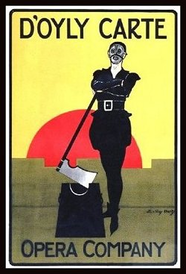
The setting of Yeomen is laid in the Tower of London in Shakespearean times. The plot concerns Colonel Fairfax, a gentleman, soldier and scientist, who has been sentenced to be beheaded in an hour on a false charge of sorcery. To avoid leaving his estate to his accuser, a cousin, and with the help of the Lieutenant of the Tower, Fairfax secretly marries Elsie Maynard, a strolling singer. The bride agrees to be blindfolded during the ceremony and expects to be a well-paid widow in an hour. With the help of the Meryll family, Fairfax escapes, throwing the Tower into confusion and the astonished Elsie, and her mentor, the jester Jack Point, who loves her, into despair. But Fairfax, disguised as Leonard Meryll, woos Elsie, and after a number of plot complications are worked out, she falls in love with Fairfax and leaves Jack Point broken-hearted.
- Sir Richard Cholmondeley, Lieutenant of the Tower (Baritone)
- Colonel Fairfax, under sentence of death (Tenor)
- Sergeant Meryll of the Yeomen of the Guard (Bass Baritone)
- Leonard Meryll, his son (Tenor)
- Jack Point, a strolling jester (Baritone)
- Wilfred Shadbolt, Head Jailer and Assistant Tormentor (Bass Baritone)
- The Headsman (Silent)
- First Yeoman (Tenor)
- Second Yeoman (Baritone)
- First Citizen (Speaking/Chorus)
- Second Citizen (Speaking/Chorus)
- Elsie Maynard, a strolling singer (Soprano)
- Phœbe Meryll, Sergeant Meryll's daughter (Mezzo Soprano)
- Dame Carruthers, Housekeeper to the Tower (Contralto)
- Kate, her niece (Soprano)
- Chorus of Yeomen Warders, Gentlemen and Citizens
"The Gondoliers" or "The King of Barataria" (1889)
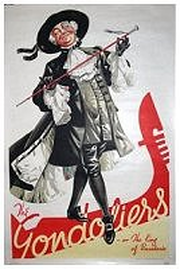
The story of the opera concerns the young bride of the heir to the throne of Barataria who arrives in Venice to join her husband. It turns out, however, that he cannot be identified, since he was entrusted to the care of a drunken gondolier who mixed up the prince with his own son. To complicate matters, the King of Barataria has just been killed. The two young gondoliers must now jointly rule the kingdom until the nurse of the prince can be brought in to determine which of them is the rightful king. Moreover, when the young queen arrives to claim her husband, she finds that the two gondoliers have both recently married local girls. A last complicating factor is that she, herself, is in love with another man.
- The Duke of Plaza-Toro, A Grandee of Spain (Baritone)
- Luiz, his Attendant (Baritone)
- Don Alhambra del Bolero, the Grand Inquisitor (Bass Baritone)
- Marco Palmieri, Venetian Gondolier (Tenor)
- Giuseppe Palmieri, Venetian Gondolier (Baritone)
- Antonio, Venetian Gondolier (Baritone)
- Francesco, Venetian Gondolier (Tenor)
- Giorgio, Venetian Gondolier (Bass)
- Annibale, Venetian Gondolier (Speaking Role/Chorus)
- The Duchess of Plaza-Toro (Contralto)
- Casilda, her Daughter (Soprano)
- Gianetta, Contadina (Soprano)
- Tessa, Contadina (Mezzo Soprano)
- Fiametta, Contadina (Soprano)
- Vittoria, Contadina (Mezzo Soprano)
- Giulia, Contadina (Mezzo Soprano)
- Inez, the King's Foster Mother (Contralto)
- Chorus of Gondoliers, Men at Arms, Heralds, Pages and Contadine
"Utopia Limited" or "The Flowers of Progress" (1893)

For many years, the South Sea island of Utopia has been the home of a languid and lazy people, ruled by a benevolent King who is, in theory, an absolute monarch. His power, however, is held in check by two Wise Men, judges of the Utopian supreme court, who have only to denounce him for any lapse from political or social propriety to the Public Exploder in order to have the King exploded on the spot. The present monarch, a great admirer of English culture, is deeply in love with the English governess he has hired to teach English ways to his two younger daughters. However, the governess (Lady Sophy) will have none of him, as the present Wise Men have forced him to write anonymous scurrilous (and untrue) articles about himself in a sort of tabloid newspaper; and Lady Sophy, having seen the articles, believes the King to be much beneath her in terms of respectability. This is the state of affairs when the princess Zara, the King's eldest daughter, returns from college in England. Indignant at her father's degraded position, she comes up with a plan. She has brought with her six shining representatives of English culture (the Flowers of Progress) in order to completely reform Utopian institutions. One of them is a Company Promoter, and under his remarkable influence every Utopian citizen turns himself into a Company Limited (complete with Prospectus) and liable only for the amount of his declared capital, which does not include explosion! Once they realize that this implies that the King is now immune to being exploded, the Wise Men and Public Exploder are understandably annoyed. They rouse the Utopian citizenry to revolt, on the grounds that the country is so healthy under the new sanitation that the doctors are starving, and the new laws have so extinguished crime and litigation that all the lawyers are out of work, etc. Suddenly, however, Zara realizes she has left something out of her perfect emulation of English society: Government by Party! "No political measures will endure, because one Party will assuredly undo all that the other Party has done, and while grouse is to be shot, and foxes worried to death, the legislative action of the country will be at a standstill. Then there will be sickness in plenty, endless lawsuits, crowded jails, interminable confusion in the Army and Navy, and, in short, general and unexampled prosperity!" The populace is well contented with this proposition, and the Wise Men are led off in defeat. And so they all married each other, and lived happily (well, prosperously, anyway) ever after.
Utopians
Utopians
- King Paramount the First, King of Utopia (Baritone
- Phantis, Judge of the Utopian Supreme Court (Comic Baritone)
- Scaphio, Judge of the Utopian Supreme Court (Comic Baritone)
- Tarara, The Public Exploder (Comic Baritone)
- Calynx, The Utopian Vice-Chamberlain (Speaking Role)
- The Princess Zara, Eldest Daughter of King Paramount (Soprano)
- The Princess Nekaya, Her Younger Sister (Soprano)
- The Princess Kalyba, Her Younger Sister (Mezzo Soprano)
- The Lady Sophy, Their English Gouvernante (Contralto)
- Salata, Utopian Maiden (Speaking)
- Melene, Utopian Maiden (Speaking)
- Phylla, Utopian Maiden (Soprano)
- Lord Dramaleigh, a British Lord Chamberlain (Baritone)
- Captain Fitzbattleaxe, First Life Guards (Tenor)
- Captain Sir Edward Corcoran, KCB, of the Royal Navy (Bass)
- Mr. Goldbury, a Company Promoter, later Comptroller of the Utopian Household (Baritone)
- Sir Bailey Barre, Q.C., MP (Tenor)
- Mr. Blushington, of the County Council (Baritone)
"The Grand Duke" or "The Statutory Dual" (1896)

In The Grand Duke, Gilbert and Sullivan come full circle, back to the theme of their first collaboration, Thespis, a troupe of actors taking political power. The plot hinges on the misinterpretation of a 100 year old law regarding statutory duels which are decided by drawing cards. The baffled leading man of the troupe, Ludwig, spearheads the rebellion against the hypochondriac, miserly Grand Duke and becomes engaged to four different women before the plot is resolved.
- Rudolph, Grand Duke of Pfennig Halbpfennig (Comic Baritone)
- Ernest Dummkopf, a Theatrical Manager (Tenor)
- Ludwig, his Leading Comedian (Baritone)
- Dr. Tannhäuser, a Notary (Baritone)
- The Prince of Monte Carlo (Baritone)
- Viscount Mentone (Speaking Role)
- Ben Hashbaz, a Costumier (Any Male Voice)
- Herald (Baritone)
- The Princess of Monte Carlo, Betrothed to Rudolph (Soprano)
- The Baroness Von Krakenfeldt, Betrothed to Rudolph (Contralto)
- Julia Jellicoe, an English Comédienne (Soprano)
- Lisa, a Soubrette (Mezzo Soprano)
- Olga A Member of Ernest Dummkopf’s Company (Any Female Voice)
- Gretchen, A Member of Ernest Dummkopf’s Company (Any Female Voice)
- Bertha, A Member of Ernest Dummkopf’s Company (Any Female Voice)
- Elsa, A Member of Ernest Dummkopf’s Company (Any Female Voice)
- Martha, A Member of Ernest Dummkopf’s Company (Any Female Voice)
- Chorus of Chamberlains, Nobles, Actors and Actresses
